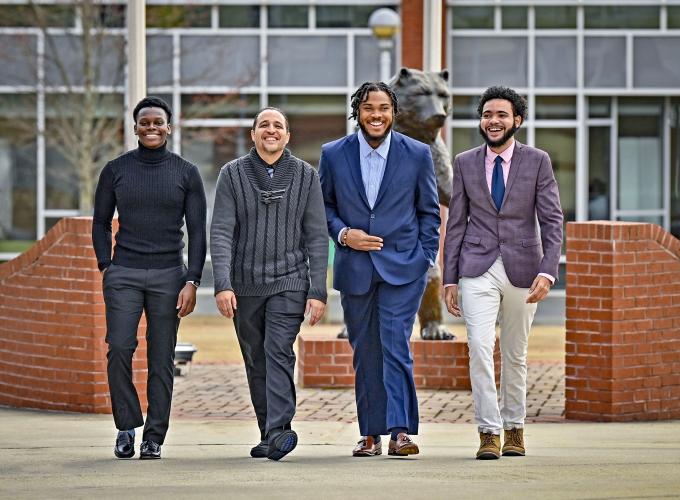Jamarius Strong-Williams has dreams of working in healthcare. The 19-year-old Georgia Gwinnett College (GGC) majors in biology with a concentration in biochemistry in the hope of someday becoming a surgeon. But Strong-Williams said that having grown up in the town of Covington, about 35 miles southeast of Atlanta, he felt that such big dreams were elusive for a small-town African American male, where the poverty rate is 21%, nearly double the average of the poverty rate in Georgia.
“Where I come from, there are not many people – really anybody at all – who say they want to be things; its more about money,” he said. “Surgery isn’t about that – it’s about helping people and giving them the effective care that's needed.”
When Strong-Williams became a GGC student, he was invited to join the college’s African American Male Initiative/Elite Scholars (AAMI), where he met Harrison Clark, a student who had some big dreams of his own.
“When I came to GGC, I met Harrison through AAMI,” said Strong-Williams. “Harrison told me he wanted to be a lawyer, which gave me more confidence to be more open about what I wanted to be. I saw that everyone wanted to be something major that not a lot of African Americans wanted to be.”
Like Strong-Williams, Harrison Clark hails from Lithonia, a small town. An Atlanta suburb, Lithonia is a just a few miles northwest of Covington with a population of about 2,700 people, 16% of them with a college degree. Because Clark graduated from high school with a 1.5 GPA, he described higher education as a “bygone fantasy.” The son of an African American father and a white mother, Clark struggled with his identity and felt like an outsider in a predominately Black community. But Clark knew that his road to success ran through a classroom. So, he became a GGC student and subsequently joined the AAMI. There, he found not only support and understanding – he found brotherhood. Clark finally found where he fit in.
“In AAMI, the demographic is dark-skinned black students, who are usually the most marginalized,” Clark said. “I came in as someone with a lighter complexion and initially, I told myself I was an outsider. But time and time again, they would reassured me I was in the right place, and I started to drop those walls.”
The AAMI is an initiative of the University System of Georgia, launched to improve black male graduation rates in its 26 schools, including GGC. GGC’s AAMI/Elite Scholars program, debuted at the college in 2011. It’s designed to meet students where they are, according to Dr. Brandon Lewis, who began overseeing the initiative in 2021. Lewis, an associate professor in GGC’s School of Education, sees the program as the catalyst that attracts historically marginalized students, gives them an outlet for their experiences and feelings and offers a way for them to navigate their college experience – and beyond – with purpose.
“When you look at the Black male experiences in the history of America, it gets difficult and complex to have conversations to talk about these things in a healthy way,” said Lewis. “When you bring this group together, we have a synergy, a connection to where we’re able to talk about the problems, issues that we are facing and how can we lean on each other. How do we figure out these tremendous issues that face us every day? AAMI is designed to support retention and graduation, but it’s beyond that. We want to work toward how our members can be healthy, successful and prosperous at GGC and beyond the college.”
AAMI activities are plentiful and varied. The group hosts discussion sessions, where guest speakers and GGC AAMI alumni return to the college to speak to group members. Students participate in peer mentoring, where older AAMI members mentor their first- and second-year counterparts. AAMI members can also tutor students at the library or in the residence halls. Members conduct research about social and global issues and present the findings to their peers. They go on field trips, such as Atlanta’s Apex Museum to study the impact of 20th century Black America. Recently, AAMI members participated in a luncheon event with GGC President Jann L. Joseph to share their thoughts and ideas about the school and its offerings.
Business management student and AAMI member Gustavious Maddox attended the luncheon. He described the AAMI as a “brotherhood” that pulls people from disparate backgrounds together where all can depend on each other. He said the AAMI helped him feel at home and allowed him to participate in activities that he never dreamed he would.
“For example, I never thought I would have lunch with a college president,” he said.
In leading the group, Lewis said he’s trying to change the narrative of the negative stereotypes that society has about Black males and that Black males might have about themselves.
“AAMI creates a counternarrative and overtly demonstrates that our students have a beautiful, proud history and legacy,” he said. “We want our students to continue with that history and legacy – not for others, but for ourselves. We want to show who we really are.”

